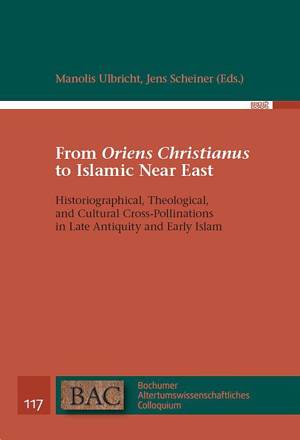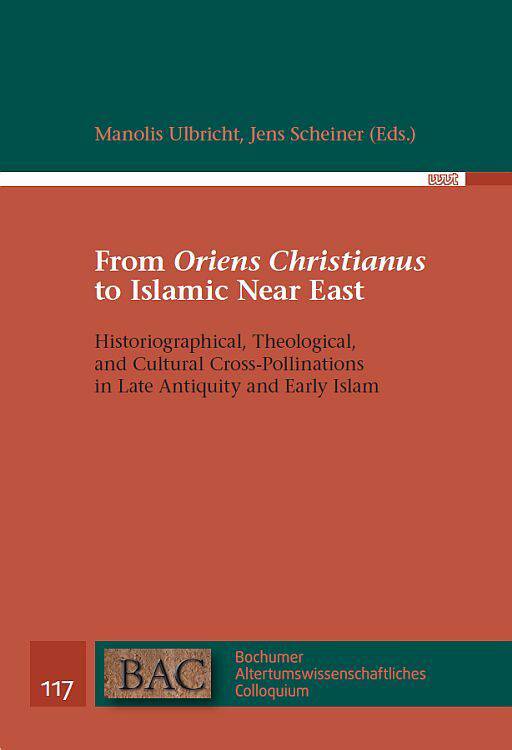
- Afhalen na 1 uur in een winkel met voorraad
- Gratis thuislevering in België vanaf € 30
- Ruim aanbod met 7 miljoen producten
- Afhalen na 1 uur in een winkel met voorraad
- Gratis thuislevering in België vanaf € 30
- Ruim aanbod met 7 miljoen producten
Zoeken
From 'Oriens Christianus' to Islamic Near East
Historiographical, Theological, and Cultural Cross-Pollinations in Late Antiquity and Early Islam
€ 32,45
+ 64 punten
Omschrijving
The volume offers a new contribution to the study of the Near East and Eastern Mediterranean during Late Antiquity, the Early Islamic and Medieval periods. Originating from a two-day workshop held at the Chair of Byzantine Studies at Freie Universität Berlin (Dec. 7th-8th, 2017), it approaches Christian-Muslim coexistence between the fourth and tenth centuries CE through an interdisciplinary lens. The objective is to present a unified and holistic approach to Late Antique and Early Islamic Studies (LAESSI), revealing the interactions that shaped the transformation from Oriens Christianus to Islamic Near East (OCINE).
The edited volume gathers an international, interdisciplinary group of scholars to explore and better understand the Near Eastern milieu in Late Antiquity and the Early Islamic period. Divided into three sections, Historiographical Cross-Pollination, Theological Cross-Pollination, and Cultural Cross-Pollination, the chapters examine the coexistence of Christian and Muslim cultural spheres in an intellectual space of complex interactions and exchanges. Discussions include a variety of perspectives on geography, historiography, philosophy, theology, imperial eschatology, and perceptions of the 'other', as well as monasticism, ecclesiastical structures, and the influence of art, epigraphy, and music in Christian-Muslim encounters.
Through this framework, the volume aims to uncover the ways these cross-pollinations impacted the development of diverse regions, cultures, languages, and religious traditions.
TABLE OF CONTENTS
MANOLIS ULBRICHT, JENS SCHEINER
Introduction 11
HISTORIOGRAPHICAL CROSS-POLLINATION
EVANGELOS CHRYSOSArabia minor, Arabia magna in Theophanes: A Short Reflection on the Late Antique World-View 19
REINHOLD F. GLEI
The Sophistication of Arguments in Theodore Abu Qurra's Dialogues with Muslims 31
YULIA FURMAN
The End of Muawiya's Reign and That of the Whole World, or Why Write a Universal History Before the End of Times 41
JONATHAN STUTZ
Christian Rome in Syriac and Arabic Historiography 55
ALFONS H. TEIPEN
Changing Perceptions of Jews, Christian Rulers, and Arabs in Early Sira-Maghazi Literature 73
THEOLOGICAL CROSS-POLLINATION
ADRIANO DUQUE
Columba's Death as a Mirror for Monastic Ideals in 9th Century Córdoba 91
NESTOR KAVVADAS
'Jerusalem Connection' - A Communication Network Between Early Islamic Palestine, Constantinople, and Italy 111
CULTURAL CROSS-POLLINATION
MARCUS MILWRIGHT
The Shock of the New? Qur anic Content in the Inscriptions of the First Islamic Century 127
SERAFIM SEPPÄLÄ
A Symbol in Tension: The Cross in the Earliest Christian-Muslim Encounter 151
MANOLIS ULBRICHT
Cultural Heritage in Religious Musical Traditions of the Eastern Mediterranean: A Study of the Byzantine Second Mode ( . beta ) and Its Relation with the Maqam huzam 167
Index 201
List of Contributors 211
The edited volume gathers an international, interdisciplinary group of scholars to explore and better understand the Near Eastern milieu in Late Antiquity and the Early Islamic period. Divided into three sections, Historiographical Cross-Pollination, Theological Cross-Pollination, and Cultural Cross-Pollination, the chapters examine the coexistence of Christian and Muslim cultural spheres in an intellectual space of complex interactions and exchanges. Discussions include a variety of perspectives on geography, historiography, philosophy, theology, imperial eschatology, and perceptions of the 'other', as well as monasticism, ecclesiastical structures, and the influence of art, epigraphy, and music in Christian-Muslim encounters.
Through this framework, the volume aims to uncover the ways these cross-pollinations impacted the development of diverse regions, cultures, languages, and religious traditions.
TABLE OF CONTENTS
MANOLIS ULBRICHT, JENS SCHEINER
Introduction 11
HISTORIOGRAPHICAL CROSS-POLLINATION
EVANGELOS CHRYSOSArabia minor, Arabia magna in Theophanes: A Short Reflection on the Late Antique World-View 19
REINHOLD F. GLEI
The Sophistication of Arguments in Theodore Abu Qurra's Dialogues with Muslims 31
YULIA FURMAN
The End of Muawiya's Reign and That of the Whole World, or Why Write a Universal History Before the End of Times 41
JONATHAN STUTZ
Christian Rome in Syriac and Arabic Historiography 55
ALFONS H. TEIPEN
Changing Perceptions of Jews, Christian Rulers, and Arabs in Early Sira-Maghazi Literature 73
THEOLOGICAL CROSS-POLLINATION
ADRIANO DUQUE
Columba's Death as a Mirror for Monastic Ideals in 9th Century Córdoba 91
NESTOR KAVVADAS
'Jerusalem Connection' - A Communication Network Between Early Islamic Palestine, Constantinople, and Italy 111
CULTURAL CROSS-POLLINATION
MARCUS MILWRIGHT
The Shock of the New? Qur anic Content in the Inscriptions of the First Islamic Century 127
SERAFIM SEPPÄLÄ
A Symbol in Tension: The Cross in the Earliest Christian-Muslim Encounter 151
MANOLIS ULBRICHT
Cultural Heritage in Religious Musical Traditions of the Eastern Mediterranean: A Study of the Byzantine Second Mode ( . beta ) and Its Relation with the Maqam huzam 167
Index 201
List of Contributors 211
Specificaties
Betrokkenen
- Uitgeverij:
Inhoud
- Aantal bladzijden:
- 214
- Taal:
- Engels
- Reeks:
- Reeksnummer:
- nr. 117
Eigenschappen
- Productcode (EAN):
- 9783989400580
- Verschijningsdatum:
- 31/01/2025
- Uitvoering:
- Paperback
- Afmetingen:
- 150 mm x 20 mm
- Gewicht:
- 392 g

Alleen bij Standaard Boekhandel
+ 64 punten op je klantenkaart van Standaard Boekhandel
Beoordelingen
We publiceren alleen reviews die voldoen aan de voorwaarden voor reviews. Bekijk onze voorwaarden voor reviews.







